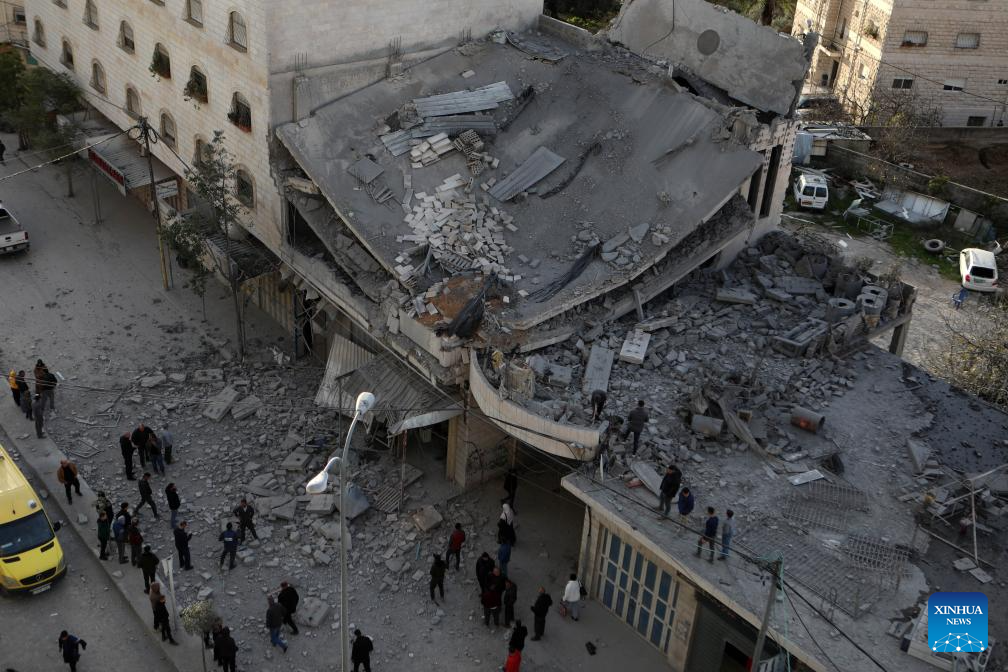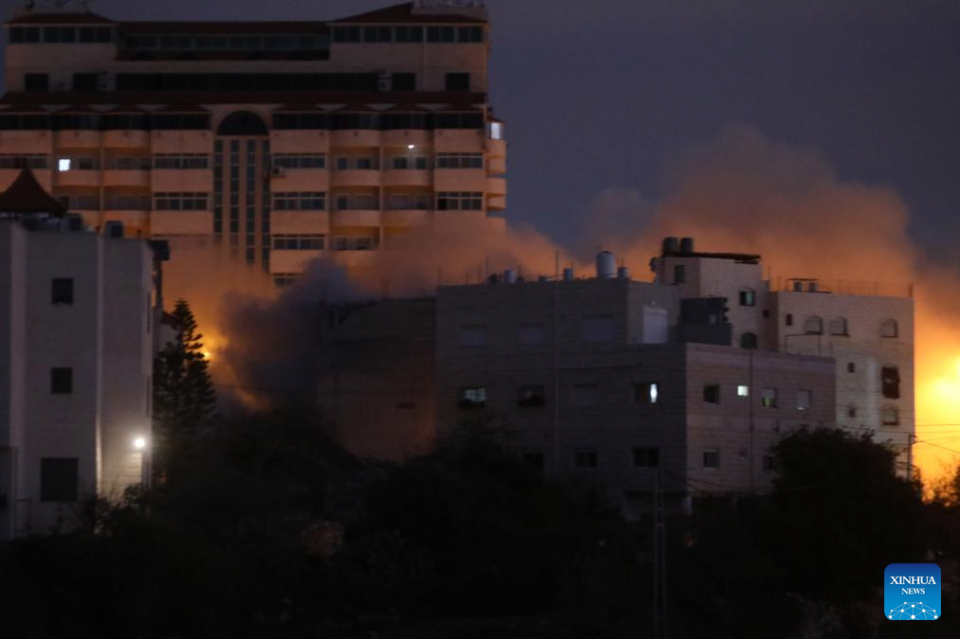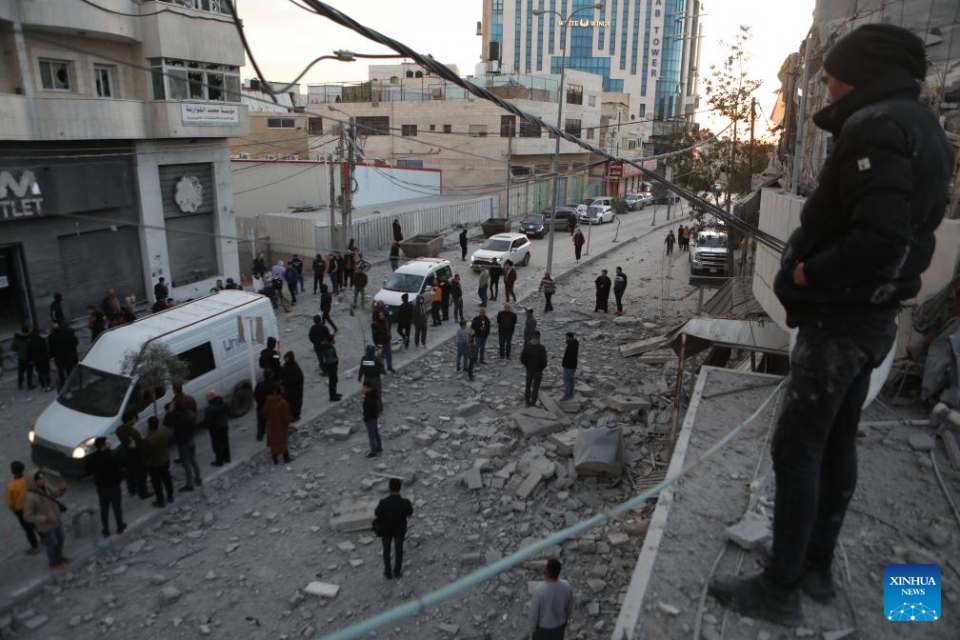
People check the rubble of a building, demolished by Israeli forces, in the West Bank city of Hebron, Jan. 21, 2024.
Israeli Prime Minister Benjamin Netanyahu on Sunday rejected a proposal of a ceasefire deal reportedly being advanced by Qatar, the United States, and Egypt, while the Israeli army continued to pound the Palestinian enclave.
Netanyahu rejected the key elements of the plan, including the prospect of establishing a Palestinian state. "I will not compromise on full Israeli security control of all territory west of the Jordan River," he said in a video address to the nation, referring to the West Bank, a territory Israel captured along with the Gaza Strip in the 1967 Middle East war. (Photo by Mamoun Wazwaz/Xinhua)
JERUSALEM, Jan. 21 (Xinhua) -- Israeli Prime Minister Benjamin Netanyahu on Sunday rejected a proposal of a ceasefire deal reportedly being advanced by Qatar, the United States, and Egypt, while the Israeli army continued to pound the Palestinian enclave.
Citing Egyptian officials, a report on Sunday by the Wall Street Journal said the mediators have proposed a 90-day plan for the ceasefire. In the first phase, the fighting will stop, and Hamas will release all Israeli civilian hostages, while Israel releases Palestinian prisoners and increases aid. The plan also includes the rebuilding of Gaza and talks for a permanent ceasefire and the relaunch of a process to establish a Palestinian state.
Netanyahu rejected the key elements of the plan, including the prospect of establishing a Palestinian state. "I will not compromise on full Israeli security control of all territory west of the Jordan River," he said in a video address to the nation, referring to the West Bank, a territory Israel captured along with the Gaza Strip in the 1967 Middle East war.
"As prime minister of Israel, I have strongly upheld this position in the face of great international and domestic pressure," he said. "As long as I am prime minister, I will continue to strongly insist on this," he added.
He said that Palestinian statehood would pose "an existential danger" to Israel, without elaborating on the reasons.
The remarks were an outright public rejection of calls for Palestinian sovereignty following talks with U.S. President Joe Biden on post-war Gaza. Netanyahu said he talked with Biden on the phone over the weekend and "emphasized our determination to achieve all the goals of the war," including the elimination of Hamas.
Netanyahu rejected Hamas' demand for an end to the war and the withdrawal of Israeli forces from Gaza as prerequisites for releasing about 130 hostages still held in Gaza. "If we agree to that, our fighters have fallen in vain, and we couldn't guarantee the security of our citizens," he said.
After a flight over Gaza, Israeli Defense Minister Yoav Galant stated that the operation in Khan Younis, previously considered a safe zone, "will soon expand. Smoke will continue to cover Gaza's skies until our goals are achieved -- the collapse of Hamas and the return of hostages."
On Sunday, the Israel Defense Forces (IDF) released footage of a kilometer-long, booby-trapped tunnel it uncovered in Khan Younis, showing narrow rooms with metal bar doors, where, according to the army, hostages were held. No hostages were found. The army said that ground, air, and naval forces have continued to strike across Gaza. A soldier was killed in fighting in the southern Gaza Strip.
According to the Hamas-run Health Ministry, a total of 178 Palestinians were killed over the past day, making it one of the deadliest days of the conflict.
At least 25,105 Palestinians, mostly women, children, and the elderly, have been killed by the Israeli strikes since Oct. 7, and 62,681 others were injured in the enclave, the ministry said in an update. ■

A building is demolished by Israeli forces in the West Bank city of Hebron, Jan. 21, 2024.
Israeli Prime Minister Benjamin Netanyahu on Sunday rejected a proposal of a ceasefire deal reportedly being advanced by Qatar, the United States, and Egypt, while the Israeli army continued to pound the Palestinian enclave.
Netanyahu rejected the key elements of the plan, including the prospect of establishing a Palestinian state. "I will not compromise on full Israeli security control of all territory west of the Jordan River," he said in a video address to the nation, referring to the West Bank, a territory Israel captured along with the Gaza Strip in the 1967 Middle East war. (Photo by Mamoun Wazwaz/Xinhua)

A building is demolished by Israeli forces in the West Bank city of Hebron, Jan. 21, 2024.
Israeli Prime Minister Benjamin Netanyahu on Sunday rejected a proposal of a ceasefire deal reportedly being advanced by Qatar, the United States, and Egypt, while the Israeli army continued to pound the Palestinian enclave.
Netanyahu rejected the key elements of the plan, including the prospect of establishing a Palestinian state. "I will not compromise on full Israeli security control of all territory west of the Jordan River," he said in a video address to the nation, referring to the West Bank, a territory Israel captured along with the Gaza Strip in the 1967 Middle East war. (Photo by Mamoun Wazwaz/Xinhua)

People check the rubble of a building, demolished by Israeli forces, in the West Bank city of Hebron, Jan. 21, 2024.
Israeli Prime Minister Benjamin Netanyahu on Sunday rejected a proposal of a ceasefire deal reportedly being advanced by Qatar, the United States, and Egypt, while the Israeli army continued to pound the Palestinian enclave.
Netanyahu rejected the key elements of the plan, including the prospect of establishing a Palestinian state. "I will not compromise on full Israeli security control of all territory west of the Jordan River," he said in a video address to the nation, referring to the West Bank, a territory Israel captured along with the Gaza Strip in the 1967 Middle East war. (Photo by Mamoun Wazwaz/Xinhua)

Israeli military vehicles are seen in the West Bank city of Hebron, Jan. 21, 2024.
Israeli Prime Minister Benjamin Netanyahu on Sunday rejected a proposal of a ceasefire deal reportedly being advanced by Qatar, the United States, and Egypt, while the Israeli army continued to pound the Palestinian enclave.
Netanyahu rejected the key elements of the plan, including the prospect of establishing a Palestinian state. "I will not compromise on full Israeli security control of all territory west of the Jordan River," he said in a video address to the nation, referring to the West Bank, a territory Israel captured along with the Gaza Strip in the 1967 Middle East war. (Photo by Mamoun Wazwaz/Xinhua)

People check the rubble of a building, demolished by Israeli forces, in the West Bank city of Hebron, Jan. 21, 2024.
Israeli Prime Minister Benjamin Netanyahu on Sunday rejected a proposal of a ceasefire deal reportedly being advanced by Qatar, the United States, and Egypt, while the Israeli army continued to pound the Palestinian enclave.
Netanyahu rejected the key elements of the plan, including the prospect of establishing a Palestinian state. "I will not compromise on full Israeli security control of all territory west of the Jordan River," he said in a video address to the nation, referring to the West Bank, a territory Israel captured along with the Gaza Strip in the 1967 Middle East war.










